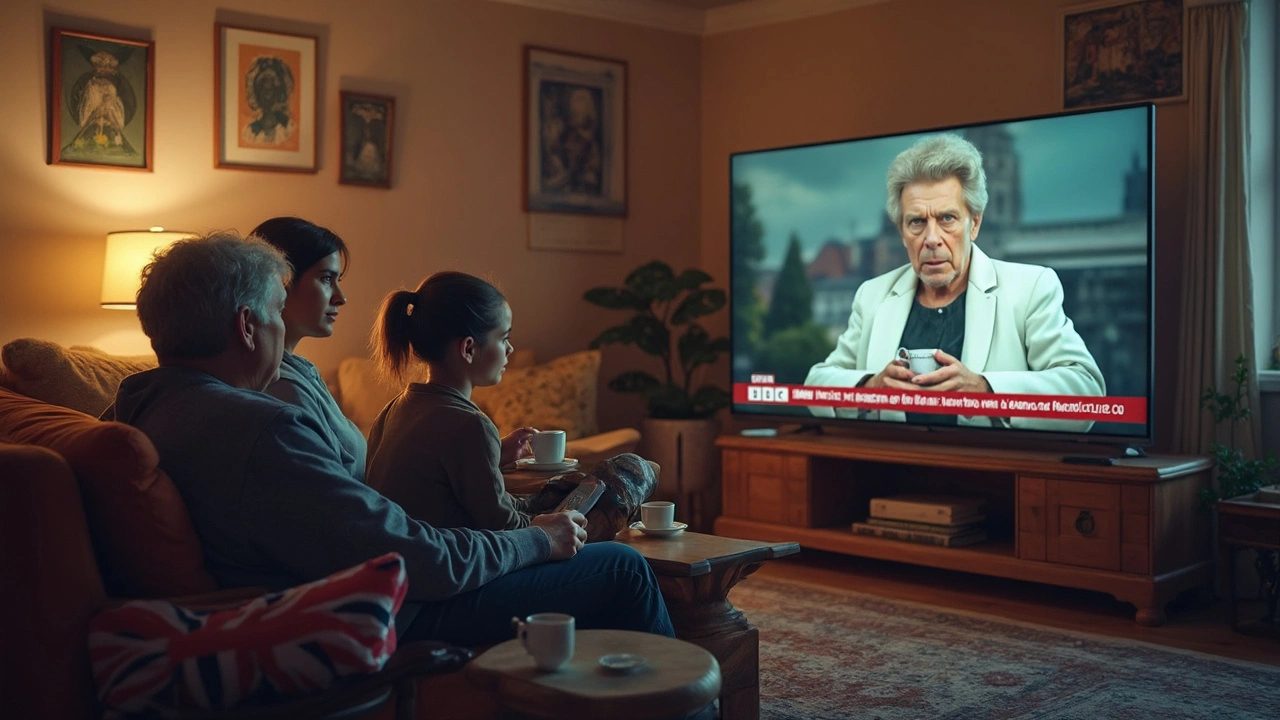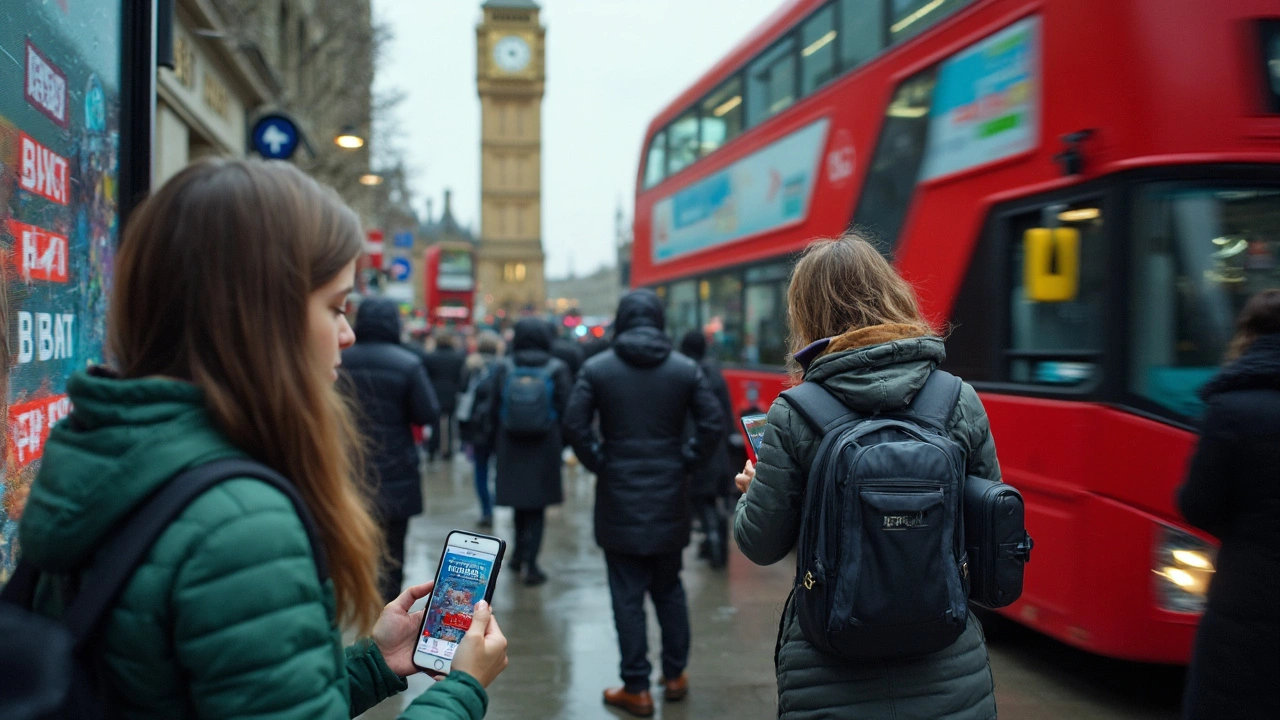
You know how quickly things change in the UK—by the time you finish breakfast, another story is already trending on BBC News. Keeping up feels like a full-time job, but there are ways to make it easier and less overwhelming.
The BBC isn’t just blasting headlines. They use reporters on the ground, public data, and carefully checked sources to build their coverage. So, when you see a big UK story break on BBC News, chances are, they’ve double-checked before pushing it out. Ever notice how some smaller stories suddenly go viral? That usually starts from local BBC branches picking up local events—your town council vote or a sudden traffic chaos—before national outlets even notice.
- How BBC Sources and Delivers UK News
- Why BBC’s Local Coverage Matters
- Making Sense of Breaking News Alerts
- Tips for Spotting Real Versus Fake News
- Best Ways to Tailor Your BBC News Feed
How BBC Sources and Delivers UK News
The BBC has this massive network of reporters—over 2,000 journalists, to be exact—working across cities, towns, and villages. These folks aren't just stuck in London; they’re attending council meetings in Liverpool, sport matches in Cardiff, and even school events in small Scottish towns. This boots-on-the-ground setup means the BBC UK News feed is packed with fresh, locally-sourced updates before most other outlets catch on.
What’s cool is that BBC has strict rules, called Editorial Guidelines, that every reporter follows. They aren’t allowed to run wild with rumors. Before any news breaks, two or more sources usually have to confirm it. This gives you a layer of trust—especially in weird moments when social media is throwing around wild claims left and right. BBC is often slower to push stories, but that’s because they’re making extra sure it’s true.
Besides humans, the BBC is big on using verified public data, like NHS figures for health news or Met Office warnings about weather. You’ll see lots of breaking stories start with "officials confirm" or "data shows," which is BBC-speak for "we double-checked." When a protest breaks out or a rail strike hits the UK, someone at the BBC is calling the unions, local police, and the transport office all at once.
Here's how the process usually works before something lands in your news feed:
- On-scene reporters send updates straight to editors.
- Editors double-check with at least one more source.
- Any facts or statistics are backed up by official documents.
- Social media is monitored, but nothing is treated as real news until confirmed.
- Only then does the news go live on BBC’s website, TV, or radio.
If you’re ever searching for the origin of a UK news story, BBC is usually where the facts come together first. It’s all about accuracy, not just being fast. That’s what makes them different from random news blogs popping up everywhere.
Why BBC’s Local Coverage Matters
People talk a lot about national headlines, but if you’ve ever wondered who covers the stories about your own street, local schools, or even the potholes on your drive to work, that’s where BBC local coverage comes in. Local BBC teams are spread out across nearly every bit of the UK, from rural Wales to downtown Manchester. There are more than 40 BBC local radio stations and dozens of newsrooms covering real people’s lives every single day.
Here’s why it matters so much:
- Local teams break news that affects your daily routine—things you probably won’t hear from London.
- With reporters living in the same area, they understand the real needs and concerns of local folks. They can spot trends and issues before anyone outside the neighborhood does.
- You get a human perspective. When something big hits—like floods, strikes, or school closures—the BBC UK News local desks are first to cover it in a way that makes sense for you.
Check out some hard numbers that drive this point home. In 2024, BBC local newsrooms:
| Region | Stories Published | Local Journalists |
|---|---|---|
| North West | 11,500 | 54 |
| London | 10,200 | 45 |
| Wales | 8,600 | 38 |
| Scotland | 9,300 | 42 |
BBC’s commitment keeps communities in the loop—sometimes before the council even updates its own website. If you want to stay ahead of what’s going on in your area, following your BBC local team is one of the smartest moves you can make. And yeah, when there’s a power cut, school announcement, or a weather warning, local BBC pages and Twitter feeds usually spill the news first.

Making Sense of Breaking News Alerts
Your phone buzzes. Another BBC UK News alert. Do you really need to stop what you’re doing? Not always. News alerts work best when they help you filter stuff that really matters from the noise. But there’s a knack to actually making these notifications useful, not just annoying.
BBC’s breaking news alerts tend to stick to important, confirmed facts. For example, BBC won’t push a breaking alert just because someone tweeted a rumor. It’s usually a major event—something like a prime minister resignation, severe weather hitting the UK, or security issues in central London. In 2024, according to BBC statistics, nearly 80% of push alerts were about either national political updates or emergency public safety incidents—that’s deliberate to avoid overloading your phone.
| Type of Alert | Percentage (%), 2024 |
|---|---|
| Political Events | 41 |
| Public Safety/Emergencies | 39 |
| Sports Results | 12 |
| Human Interest/Other | 8 |
So, what should you do when an alert comes through? Here are some tips that actually work:
- If an alert sounds urgent, tap through and scan the BBC UK News article for the basics: BBC UK News always puts the most crucial info at the top.
- Check the timestamp. BBC updates stories quickly as new info comes in. If it's over an hour old during a fast-moving story, newer details might be out.
- Take a breath before sharing on social. Posting about an incident too quickly can sometimes spread confusion. BBC usually updates stories every few minutes as things get clearer.
- Use the custom notification settings in the BBC News app. You can easily set what regions or topics you want to be alerted about—like ‘UK politics’ or ‘local emergencies’—and mute the rest.
Make the alerts work for you, not the other way around. With a couple of adjustments, you get the urgent info you need and way less digital clutter.
Tips for Spotting Real Versus Fake News
Trying to figure out what’s real in a sea of headlines is tough, especially when fake news articles are shared just as fast as the real stuff. BBC UK News checks every fact before running with a story, but not every outlet does this. You’ve probably seen wild claims, dramatic headlines, and stories filled with opinions instead of facts. Here’s how you can quickly spot whether you’re looking at the real deal or getting tricked by clickbait or straight-up fabrication.
- Check the Source: Is the story from a respected outlet like BBC UK News? Unknown websites, typos in web addresses, or odd URLs should make you stop and think.
- Look for Evidence: Reputable stories mention sources, real places, and named experts. If it just says "according to some people" or has no links, that’s suspicious.
- Reverse Image Search: Fake stories often use old or unrelated photos. Try dropping the image into Google Images to see where it’s from—sometimes it’s years old or from a different event entirely.
- Cross-Check Key Facts: If a story is true and a big deal, you’ll see it on major news sites, not just one dodgy Facebook post. BBC UK News, Sky News, ITV—if they’re all covering it, you’re less likely to be fooled.
Just so you know how fast fake news spreads, check out this comparison:
| Speed of Spread | Fact Checking | |
|---|---|---|
| Fake news | Spreads 6x faster on Twitter (MIT 2018 study) | Rarely checked |
| BBC UK News | Goes through several editors before hitting feeds | Always checked with sources |
If your kids (like my son Silas) ever come home with something wild they saw on social media, ask them these questions and walk through the steps together. Teach them to pause and check—because once you share fake news with your mates, it’s hard to walk it back.

Best Ways to Tailor Your BBC News Feed
Getting the news you actually care about isn’t tough if you know how to tweak your BBC News settings. The coolest bit is you don’t have to scroll through loads of stuff you’re not interested in. BBC’s site and app offer several ways to customize what you see and get updates that matter to you.
First off, set up a BBC account if you haven’t. It’s free and lets you tell the system exactly what topics and places you want on your radar. Once you sign in, you can:
- Choose “My News” in the app to pick specific topics: things like UK politics, your favorite sports, or environmental news. You decide what pops up first in your feed.
- Follow regional news by selecting your area—handy if you want local updates, traffic tips, or school closure alerts before you even get out the door.
- Turn on push notifications just for stories you actually care about. Don’t want to get pinged for celebrity gossip? Easy, switch off those categories in notification settings.
- If you use smart speakers, link your BBC account to Alexa or Google Assistant. Just ask for the latest headlines or bulletins, customized for your picks.
Another trick? Bookmark or save stories for later. When you spot something important but don’t have time right now, tap the bookmark icon on the app or website. Everything piles up in “Saved Stories”—no digging needed.
BBC News also lets you filter by most-read, newest, or biggest headline in each section, so you won’t miss what’s buzzing. And here’s something a lot of people forget: you can tweak privacy and tracking choices to limit what data you share while still personalizing your feed.
The point is, with a little setup, your BBC UK News experience becomes way more useful. No more endless scrolling, just straight to the stories you actually want to know about.